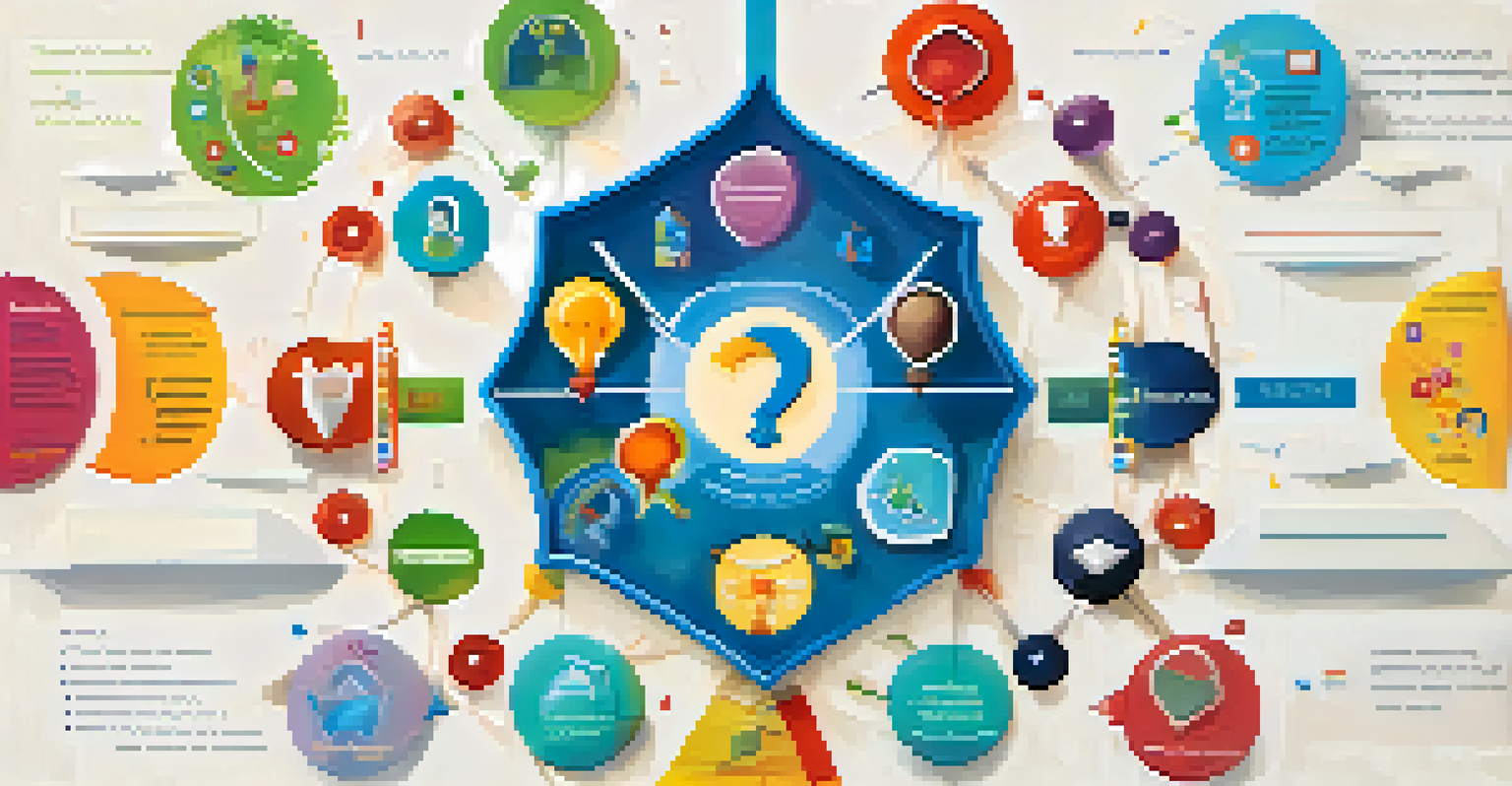Emotional Intelligence: A Key Coaching Competency

Understanding Emotional Intelligence in Coaching
Emotional intelligence (EI) refers to the ability to recognize, understand, and manage our own emotions while also being aware of the emotions of others. In coaching, EI is crucial because it allows coaches to connect with their clients on a deeper level. When a coach is emotionally intelligent, they can create a safe space for clients to express themselves freely and openly.
Emotional intelligence is not about being nice. It’s about being aware of your emotions and the emotions of others, and using that awareness to guide your actions and decisions.
This understanding helps coaches tailor their approach based on the emotional state of their clients, leading to more productive sessions. For instance, if a client is feeling anxious, a coach with high EI can employ techniques to help ease that tension, fostering a more conducive environment for growth. Essentially, emotional intelligence acts as a bridge between the coach and the client, enhancing communication and trust.
Moreover, the application of EI in coaching transcends mere conversation. It involves actively listening, empathizing, and responding appropriately to clients' emotional cues. This level of engagement not only helps clients feel valued but also encourages them to explore their feelings, leading to deeper insights and more meaningful progress.
The Components of Emotional Intelligence
Emotional intelligence comprises five key components: self-awareness, self-regulation, motivation, empathy, and social skills. Each of these elements plays a significant role in how coaches interact with their clients. For example, self-awareness allows coaches to recognize their emotional triggers, which can help them remain calm and composed during challenging discussions.

Self-regulation, on the other hand, enables coaches to manage their emotions effectively, preventing personal feelings from interfering with the coaching process. When coaches maintain their composure, clients feel more secure and are more likely to open up about their struggles and aspirations.
Emotional Intelligence Enhances Coaching
Emotional intelligence allows coaches to connect deeply with clients, fostering a supportive environment for personal growth.
Additionally, empathy is vital in establishing rapport with clients. By understanding their emotions and perspectives, coaches can provide tailored support that resonates with clients' experiences. This empathetic approach not only strengthens the coach-client relationship but also fosters an environment where clients feel heard and understood.
Why Emotional Intelligence Matters in Coaching
The significance of emotional intelligence in coaching cannot be overstated. Coaches equipped with high EI can navigate complex emotional landscapes, which often characterize personal development journeys. This ability to manage emotions effectively leads to better outcomes for clients, as they feel more supported throughout their growth process.
The greatest ability in business is to get along with others and to influence their actions.
Research shows that teams led by emotionally intelligent coaches experience higher levels of engagement and satisfaction. This is because such coaches create an inclusive and emotionally safe environment, allowing team members to express their ideas and emotions freely. When clients feel valued, they are more likely to commit to the goals set during coaching sessions.
Moreover, emotional intelligence fosters resilience in both coaches and clients. By learning to handle setbacks and challenges emotionally, clients can cultivate a growth mindset, which is essential for long-term success. A coach's ability to model this resilience through their emotional intelligence can inspire clients to adopt similar attitudes in facing their own challenges.
Developing Emotional Intelligence as a Coach
Coaches can enhance their emotional intelligence through various practices and strategies. One effective method is mindfulness, which encourages individuals to stay present and aware of their emotions. By engaging in mindfulness exercises, coaches can develop greater self-awareness and improve their ability to regulate their responses during coaching sessions.
Another way to build EI is through active listening. This involves fully concentrating on what clients are saying without formulating a response while they speak. By practicing active listening, coaches can better understand their clients' emotional states and respond in ways that are supportive and constructive.
Key Components of Emotional Intelligence
Self-awareness, self-regulation, empathy, and social skills are essential for coaches to effectively engage with clients.
Lastly, seeking feedback from clients can also bolster a coach's emotional intelligence. By asking for input on their coaching style and emotional engagement, coaches can identify areas for improvement. This openness to feedback not only enhances their EI but also demonstrates a commitment to the coaching relationship, further strengthening client trust.
Emotional Intelligence and Conflict Resolution
Conflict is an inevitable part of any coaching relationship, whether it's between a coach and a client or among team members. Coaches with high emotional intelligence are better equipped to navigate these conflicts effectively. They can identify the emotional triggers behind disagreements and facilitate discussions that promote understanding and resolution.
For instance, a coach might encounter a situation where a team member feels undervalued, leading to tension within the group. An emotionally intelligent coach can recognize these feelings and address them directly, fostering open communication and collaboration. This approach not only resolves the immediate conflict but also builds a stronger, more cohesive team.
Moreover, emotional intelligence helps coaches to remain neutral during conflicts, allowing them to mediate discussions without taking sides. By maintaining this impartiality, coaches can help clients reach mutual agreements and develop strategies that benefit all parties involved, reinforcing the importance of collaboration and teamwork.
Incorporating EI in Coaching Practices
Integrating emotional intelligence into coaching practices can be a game-changer for both coaches and clients. One effective strategy is to include EI assessments in the coaching process. By evaluating clients' emotional intelligence levels, coaches can customize their approach and address specific areas for improvement.
Additionally, incorporating EI training in workshops or group sessions can enhance collective emotional intelligence among team members. These sessions can provide valuable tools and techniques for recognizing and managing emotions, fostering a more emotionally aware environment.
EI is Crucial for Conflict Resolution
Coaches with high emotional intelligence are adept at managing conflicts, promoting understanding and collaboration among clients.
Finally, coaches can model emotional intelligence in their everyday interactions. By demonstrating self-awareness, empathy, and effective communication, coaches set an example for their clients to follow. This modeling not only reinforces the importance of EI but also encourages clients to implement these skills in their own lives.
The Future of Coaching with Emotional Intelligence
As the coaching industry continues to evolve, the role of emotional intelligence is becoming increasingly prominent. Organizations are recognizing the value of EI in enhancing team dynamics and overall productivity. Coaches who prioritize emotional intelligence are likely to stand out in a competitive market, attracting clients who seek a deeper, more meaningful coaching experience.
Moreover, the emphasis on mental health and well-being is prompting more coaches to adopt an emotionally intelligent approach. In a world where individuals are facing unprecedented stress and uncertainty, the ability to navigate emotions is essential for personal and professional success.

Looking ahead, the integration of emotional intelligence into coaching practices will likely shape the future landscape of the industry. Coaches who embrace and develop their EI will not only enhance their effectiveness but also contribute to a more compassionate and understanding coaching environment.